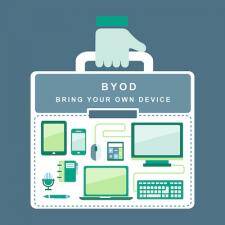Ours is a world of gadgets. There was a time when the refrigerator was revolutionary. Now we label our devices as being smart, because of their multifunctional uses. It’s an exciting time, and always interesting to see what the next big revolution or innovation will be.
Ours is a world of gadgets. There was a time when the refrigerator was revolutionary. Now we label our devices as being smart, because of their multifunctional uses. It’s an exciting time, and always interesting to see what the next big revolution or innovation will be.
While this new technology has transformed our personal lives, it has also had a profound impact on the workforce and how we do business. We’d be hard pressed to find a professional, no matter what industry he or she works in, who doesn’t work on their smartphone while also balancing a laptop or tablet. These technical devices are no longer just toys for our entertainment, but tools meant to improve productivity.

Today’s cybercriminals are inventive. They’re creative and find an increasing number of ways to access and exploit personal and professional information. Criminals aren’t respectful of the work-life balance. If we use our personal computer at work, and then bring it home for personal use, our work information on the device is still up for grabs. Hackers won’t hesitate to steal company information while we are using it on our own time. Obviously that seems silly, but it’s surprising how many people don’t consider security to be an issue once they get home. We may remember to keep strong passwords at work, only visit trusted sites and never download third-party software, yet when we go home, all that logic seems to go out the window. We visit untrusted sites, give out our email information like it was candy and download an endless supply of apps. All of these practices put our information at risk.
In an effort to counter this, businesses are trying to come up with better IT security measures. Many include mobile or business security apps meant to secure our networks and devices. Unfortunately, we’ve become so accustomed to simple devices, we want simplicity all the time. This even includes our security. Many employees are put off from using business apps and mobile security apps because of how complicated they can be. They come with long, difficult passwords and complicated log-in processes. As a result, employees get frustrated and find ways to bypass IT security measures in order to get to their work faster. Not surprisingly, this approach leaves our devices incredibly vulnerable.
Another concern employees seem to have is the current security measures of their networks. There seems to be a lack of trust on the part of employees. They feel the measures currently in place don’t do enough to protect company (or personal) information. Companies need to do a better job of incorporating outdated controls or practices in order to better secure their networks and regain the trust of their employees. But that won’t be enough. As stated earlier, employees will continue to avoid secure apps as long as they remain frustrating. There will need to be solutions that are still secure, but don’t have the complex sign-in processes.
One of the best ways to deal with this problem is through proper communication and training. There are lots of threats from hackers, but often the most common threat facing a business comes from within. Careless behavior or misunderstood policies open the door for threats. If your company offers training sessions that explain why certain practices are in place, and how to go about protecting company data, employees will respond much better. This will cause IT security to improve tenfold. This could also be an appropriate forum for employees to discuss their concerns and issues with business and mobile apps, and work towards finding an appropriate solution.
BYOD / shutterstock